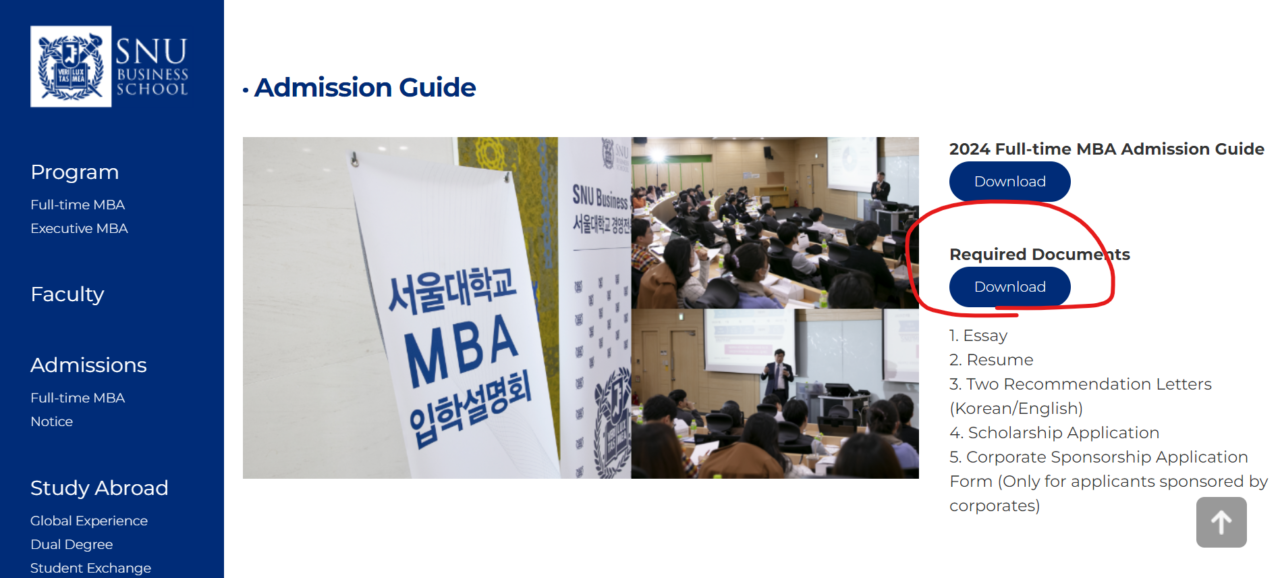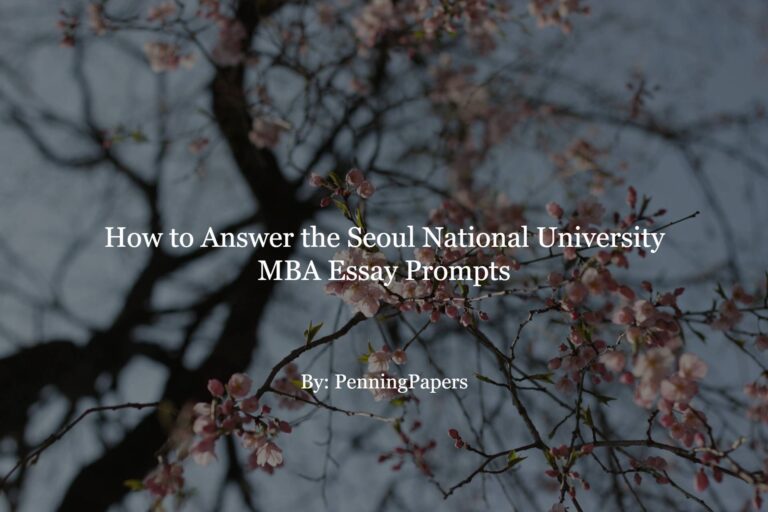Seoul National University (SNU) doesn’t give a lot of advice on what to write on the MBA essay prompts. Additionally, advice on the internet appears sparse and thin on the topic.
That’s why we created this guide: to provide you with comprehensive advice on how to approach each of these prompts properly. If you want to write strong SNU essays that cut through the competition, take careful note of the advice we provide below. After all, for a SKY school at South Korea’s top institution, nothing short of above and beyond will be acceptable.
In this article, we’ll be discussing everything you need to know to successfully answer the Seoul National University MBA essay prompts.
Additionally, if you are unsure of any sections, have any questions, or wish to receive essay help for SNU and other universities, consider reaching out to us for a free consultation.
Table of Contents:
- How to Find Seoul National University’s (SNU) MBA Essay Prompts.
- How to Answer the Seoul National University MBA Essay Prompts.
- SNU MBA Prompt 1: What are your two most important accomplishments and why do you think so? (10 font, max. 2 pages)
- SNU MBA Prompt 2: What are your future short-term and long-term career goals? How would an MBA from SNU help you achieve these goals? (10 font, max. 2 pages)
- SNU MBA Prompt 3: What has been the greatest challenge to your value system that you’ve faced and how did you handle it? (10 font, max. 1 page)
- SNU MBA Prompt 4 (optional): Is there any further information that you wish to provide to the Admission Committee? Please use this space to provide an explanation of any areas of concern in your academic record or personal history. (10 font, max. 1 page)
How to Find Seoul National University’s (SNU) MBA Essay Prompts.

SNU has 4 essay prompts titled “self-introduction and career plan essay.”
You can access this by scrolling down on the page to the section titled “Admissions Guide.” There, go to the right and click the “Download” button beneath “Required Documents.”

You should receive a folder containing information on all the required documents you must submit in your application.
Go to the document titled “Self-introduction and career plan_Essay.” In Hangul, it should read, “자기소개 및 경력계획서_Essay.docx”

The Admission Committee will consider carefully the answers to the following questions. Please complete all of the essay questions giving word counts for each answer.
How to Answer the Seoul National University MBA Essay Prompts.

Keep in mind you don’t need to write very long essays. These shouldn’t fill up space just for the sake of it. So, no unecessary fluff.
Nonetheless, it’s still good to get as close to the maximum page limit as possible (without being pointlessly verbose).
SNU MBA Prompt 1: What are your two most important accomplishments and why do you think so? (10 font, max. 2 pages)

You probably already know this, but we’ll say it anyway: space your accomplishments evenly.
That is, don’t describe one accomplishment in many words while keeping the other thin and sparse. Make sure each of them is given enough words and paragraphs. We recommend dedicating the first page to one accomplishment, and the second to the other.
Okay, now here’s a very important detail about the first SNU MBA prompt. The part describing WHY you believe these 2 accomplishments are your most important is a very, very crucial element. It’s the most important part of this essay.
First, students often make the mistake of not actually articulating in full detail WHY they consider their two accomplishments most important. There should be descriptions connecting your reasons for considering your two accomplishments as meaningful. What makes them so important? Why do you care so deeply about these compared to other accomplishments you’ve made? And, don’t forget, you shouldn’t make your argument circular. It should be productively descriptive.
The reasons you use to describe WHY also measure of your sophistication. Admissions officers will use this section to determine your ability to conjure creative, fascinating, and unique reasons behind your answer. Thus, to answer the first SNU MBA prompt, you’ll need a profound personal philosophy to ground your answer.
Here’s an example.
Bad Example Topic for Seoul National University MBA Essay Prompt 1
The most important accomplishment I’ve earned was in working with my father’s company. In there, I worked as an intern and oversaw what my fellow colleagues were doing.
I managed to help keep workers motivated on their tasks and improve their efficiency. And, in the end, I was awarded with an honorary mention in the company for my efforts and achievements.
What makes this a weak topic is just how little there is to work with. When using a topic like this, all one can really say is that they’ve served as an overseer in a position granted by family. And, that doesn’t really enlighten admissions officers of your actual qualities and abilities.
Additionally, the main focus here is the applicant’s title supervising his colleagues. And, it upholds the honorary mention as the important conclusion to draw.
Titles, awards, and honorary mentions don’t say much about a person: especially when many of them can be faked. If anything, you should be focusing on the tangible work and achievements you’ve done that prove your positive personality and character traits.
Remember: the topic should be something that makes it easy for admissions officers to draw positive conclusions out of.
Now, let’s take a look at a stronger example.
Good Example Topic for Seoul National University MBA Essay Prompt 1
When I was working for my father’s company, there was a time when everyone didn’t know how to solve a problem. It was pertaining to optimizing the efficiency of a menial task that would be very laborious for most workers to do. So, I’ve coded a program that would run a script which made the program more efficient.
This accomplishment is important to me because, while it’s not as profoundly loud as the awards or competitions I’ve won, it was something that touched me deep in my heart. For, I find the inefficiency of laborious tasks, especially those that impede on the work and progress of people who have important jobs and projects, to be one of the most sinful things that can occur in the workplace. Most people who truly care about their work, whether it be research or projects in industry, don’t just work for a paycheck; rather, they also have a love and care for the field that they’re in. So, to see precious minutes, hours, and days pass by due to everyday inefficiencies that could simply be automated through script programming is heartbreaking.
And, as a side note to the matter, I also learned a lot about my father’s industry of fabrics manufacturing as a result of programming this feature. While I’m no manufacturer myself, I found a lot of parallels between the manufacturing world and the programming world that I may otherwise not have considered as similar or consisting of similar parts. Thus, this experience has opened my taste for intellectual curiosity beyond my own major.
In this example, the topic isn’t really all that different. The topic is still about holding a position that the writer’s dad gave. However, instead of fancy titles and awards, the writer focuses the accomplishment more on the action that they took. In this case, it involves creating a script for his fellow colleagues.
Notice how the accomplishment or “reward” itself is not self-congratulatory? In fact, the reward is in helping other people make their lives easier.
This helps admissions officers draw a handful of powerful conclusions.
- This is a student who values efficiency.
- This student cares about other people and their time.
- This student is humble enough not to brag about big titles that don’t hold weight.
- This student is honest and trustworthy since the work they’ve done doesn’t fail, as it’s a piece of software.
- This student is open-minded enough to implement their expertise in coding into an industry “fabric manufacturing” that is normally very different from his own. And, is willing to learn from it.
This is why the “why” section of this essay may be even more important than the essay topic itself! It demonstrates how you articulate, analyze, and process the important underlying meaning behind your topics.
SNU MBA Prompt 2: What are your future short-term and long-term career goals? How would an MBA from SNU help you achieve these goals? (10 font, max. 2 pages)

Throughout the SNU MBA essay prompt 2, ask yourself this:
What is the admissions office ACTUALLY asking? What do they really want to know about you by asking this prompt? How does your answer show them things about you that make you a great candidate?
In this case, what do your short and long-term goals say about you as a person?
Depending on your answers, SNU’s admissions office may determine if you’re someone who can create reasonable and actionable plans. Your answer also shows how “realistic” and “mature” your planning skills are. And, they reveal your dedication to such plans.
Thus, for the SNU MBA prompt 2, specificity is your best friend.
The more specific your plans are, the better. Don’t be vague and just “ride on the coattails” of SNU’s prestigious name. Show that you’re a go-getters who can actualize success by using SNU’s MBA resources.
Now, let’s talk about goals.
You want to have an answer about your future goals that is unique. However, it’s crucial to note that some people try too hard to be unique. They start to care more about making a satisfactory answer that stands out rather than speaking the truth in the most forthright, well-articulated, and properly planned goals.
Here’s an example of a bad and good goal for this prompt.
Bad Example Topic for Seoul National University MBA Essay Prompt 2
Considering the modern micro and macroeconomic fluctuations of today’s market climate, I believe it my responsibility to actualize new models of growth for small businesses that will promote organic growth to make the world a better place. Seoul National University (SNU) is the best place to learn the ropes to join the world of investment and finance industry. In doing so, I hope to become an operations manager for my parents’ company to disrupt the industry with new innovation and streamlined workflow. By joining, I will be capable of using what I’ve learned at SNU to disrupt the market and create opportunities in the market that needs it most. And, I’m excited to do so at SNU.
Do you see what’s wrong with this example?
3…2…1… okay, guess!
If you guessed it’s vague jargon, you’re correct!
In fact, if you actually read through this example topic carefully, you’ll realize it doesn’t even make much sense at all. Joining the world of finance through being an operations manager will NOT change or disrupt markets like the statement says unless they’re being very particular with their plans.
In the world of business, especially in an MBA application, you want to be very clear with your goals and intentions. If you obscure your future goals and aspirations with unclear messages that don’t exactly explain what you want to do, you only isolate yourself from the admissions officers. It’s your duty to be clear, concise, and particular about the things you want to do such that admissions officers can analyze them for themselves.
Vague plans with unclear wording like business jargon can make it easy for admissions officers to see that you don’t have a plan. It proves to them that you’re not as informed about what you want as you think you are.
Tip: if you’re not quite sure what you want out of a Seoul National University MBA program but still want to answer this question well, don’t worry! It takes some time to brainstorm before most people can have a solid answer that’s sufficiently specific enough for this prompt. If you need help brainstorming for this topic, feel free to contact us for a free consultation: we’d be happy to help with generating ideas and even helping with the SNU MBA application essay!
Good Example Topic for Seoul National University MBA Essay Prompt 2
As of now, I recognize my work in my family’s business is falling short. That is, I serve as a manager for my family’s business overseeing the work that other fellow staff members are tasked with. And, while I have the hands on work experience granted by my family and through the passage of time, I still lack the fundamental theoretical knowledge that so constitutes an MBA background.
I believe grounding my knowledge in theoretical and advanced processes of business and administration through SNU’s comprehensive MBA program would solidify my knowledge in the field and ultimately help my family and I scale our business to much higher heights. For, I would be well-equipped through connections, professor research, and academic rigor to engage with the lateral thinking required to get give our business the “extra push” it needs to truly scale.
This business holds both financial and sentimental value to my family and I; and, ensuring client needs are met is a personal objective I’ve dedicated to that I believe is best achieved through a theoretical framework in business and administration knowledge afforded here at SNU.
As you can see, the first is much more well-articulated and demonstrates thorough research into the answer. However, the second answer is flat and cannot sway admissions officers, as it can be seen anywhere else. Remember: the more specific you are about the details, the better.
SNU MBA Prompt 3: What has been the greatest challenge to your value system that you’ve faced and how did you handle it? (10 font, max. 1 page)

This is a hard one.
Seoul National University’s 3rd MBA prompt asks you to talk about the greatest challenge to your value system. And, they want to know how you faced or handled the situation.
When answering this prompt, keep these two things in mind:
- The most intriguing, interesting, and unique answers are often those that have a lot at stake.
- This means it shouldn’t be a low-effort or low-cost disagreement to your value systems. Typically, these questions are those that will pull you in multiple directions where there is no right or wrong answer.
- The manner in which you handle difficult situations with grace and professionalism.
- This is also an opportunity to show SNU how you can navigate difficult problems in ways that most other people don’t think of. That is, showing your creativity during times of personal moral trouble.
Here’s an example topic that may work well.
“… I grew up in a very traditionally Korean household. While I temporarily grew up in the States, and was grateful for all that I’ve learned from there including the language and culture alongside it, I mostly called Korea my home. And, it was for this that I lived under its particularly traditional culture.
However, while my culture has built the foundations of a meaningfully happy and successful future in many aspects, socially, financially, and personally, it wasn’t as if it didn’t contain cracks.
In particular, I started to notice how the discrepancies of treatment between my sister and brother had impacted their relationship. Tradition dictated that my brother receive as much emotional support as possible, to the point of spoiling and alienation from true autonomy. Meanwhile, my sister continually received the short end of the stick, which instantiated in her mind the perception my family didn’t truly care for her.
I wanted to say something. I truly did. For, I knew it would benefit my family’s relationship with my siblings; but, I knew contradicting them would be the start of many fights and unhappy conversations. Additionally, my mother and father were diagnosed with Narcissistic Personality Disorder (NPD) and Bipolar Disorder (BPD) respectively; so, speaking incongruently with their own personal beliefs would mean havoc and mayhem in the household.
Weirdly enough as a person who loves to think themselves a business-minded and logical person, it was during times of emotional and moral distress and disagreement that I turned to more artistic solutions. That is, I always turned to the philosophies of great literary thinkers like that of Russia to guide my conscience. In this instance, I turned to Dostoevsky and his wisdom displayed in “Crime and Punishment.”
“Nothing in the world is harder than speaking the truth and nothing easier than flattery. If there’s the hundredth part of a false note in speaking the truth, it leads to a discord, and that leads to trouble.”
And, in my own life, I took that to heart. I would speak the truth of what I thought, even if my mind was afraid of the consequences that would follow.
I spoke up against my family for their preferential treatment for my older brother and disregard for my younger sister. I explained in slow yet articulated and careful speech how my family’s treatment and talks with them was a subtle abuse of power that would inexorably alienate them from my siblings. It was a truth that would contradict a lot of the traditional Korean philosophies that we grew up in. And, it would certainly make both my siblings and parents very, very uncomfortable.
To be frank, it was hard. To speak up against my family’s mistreatment knowing everything they’ve done to work hard for a better future for us made me feel ungrateful and certainly disrespectful. Not to mention, I was running perpendicular to the very culture I grew up in. However, it was a truth that needed to be said to truly pluck out the pathology from our family dynamic…”
Example Excerpt for Seoul National University SNU MBA Prompt 3
What makes this one work so well is the stakes.
On one hand, the applicant is pulled in multiple directions: dedication to culture , dedication to siblings and family, and dedication to the truth. Admissions officers can recognize the writer is struggling between dedication to his culture and breaking his culture for the sanctity of his family’s relations. Additionally, they are in a tight spot where criticism means familial damage and havoc, as both his parents have personality disorders which make navigating productive disagreement difficult. It means having to go against the grain of traditional Korean culture by defying parents for the sake of equal treatment.
The other great thing about this response is how the writer references their method for negotiation. While they’re a business-minded person, they’re not so robotic as to be devoid of emotional elements of life. That’s why they draw to philosophies and great thinkers such as Russian literary masterpieces to guide them on their personal beliefs. It’s something that shows admissions officers that the applicant has a level of sophistication to their decision making skills. And, it’s a great window into how the applicant handles personal matters outside of work that involve moral grey areas.
SNU MBA Prompt 4 (optional): Is there any further information that you wish to provide to the Admission Committee? Please use this space to provide an explanation of any areas of concern in your academic record or personal history. (10 font, max. 1 page)

This is prompt is, as mentioned in the title, optional. You are NOT obligated to submit this prompt if you want to successfully get accepted into Seoul National University.
Now, the real question is this. Should you answer the SNU MBA optional prompt 4?
Here’s the short answer. You should ONLY write an essay for SNU’s MBA optional essay prompt if you have information that qualifies as “worthy of additional information.” This can include anything from dips in grades to personal emergencies that led to disadvantages.
The optional prompt 4 essay does NOT serve as a space for you to demonstrate your interest in the MBA program. It also does NOT serve as a space to brag or talk about personal accomplishments.
As a general rule, this space should only be used for students who have details in their application that would change the admissions officer’s impression that requires explanation.
Here is a short list of example topics that may qualify.
- Sudden improvements in grades in your transcript.
- Sudden decreases in grades in your trascript.
- Learning conditions such as ADHD or Dyslexia.
- Certain personal emergencies such as family diseases or injuries.
- Experiences that have made a massive impact on your academic experience overall.
The key here is to use the topic to show how you’re a strong candidate for the school. For instance, students who had sudden improvements in academic performance may have learned how to improve their study strategies, which makes them a solid candidate for SNU. Students who may have had decreases in grades due to learning conditions like ADHD may have needed to adapt to their environment in ways that neurotypical students never needed to; thus, they have a level of grit and determination that few students have.
So, in short: Seoul National University’s optional prompt is a great way of leveraging your topic to turn weaknesses into strengths.
Of course, if you’re unsure whether your topic qualifies or is strong enough for SNU’s optional prompt 4, consider speaking with us through a free consultation. We’ll brainstorm with you and discuss how to improve the essay.
For students who are looking for help with writing their Seoul National University MBA Essay, don’t worry! At PenningPapers, we’ve helped countless students get accepted into some of the most prestigious schools in the world. Contact us for a free consultation, and we’ll get back to you within 24 hours. Our expert college admissions consultants and advisors can help you every step of the way, from brainstorming to writing.

